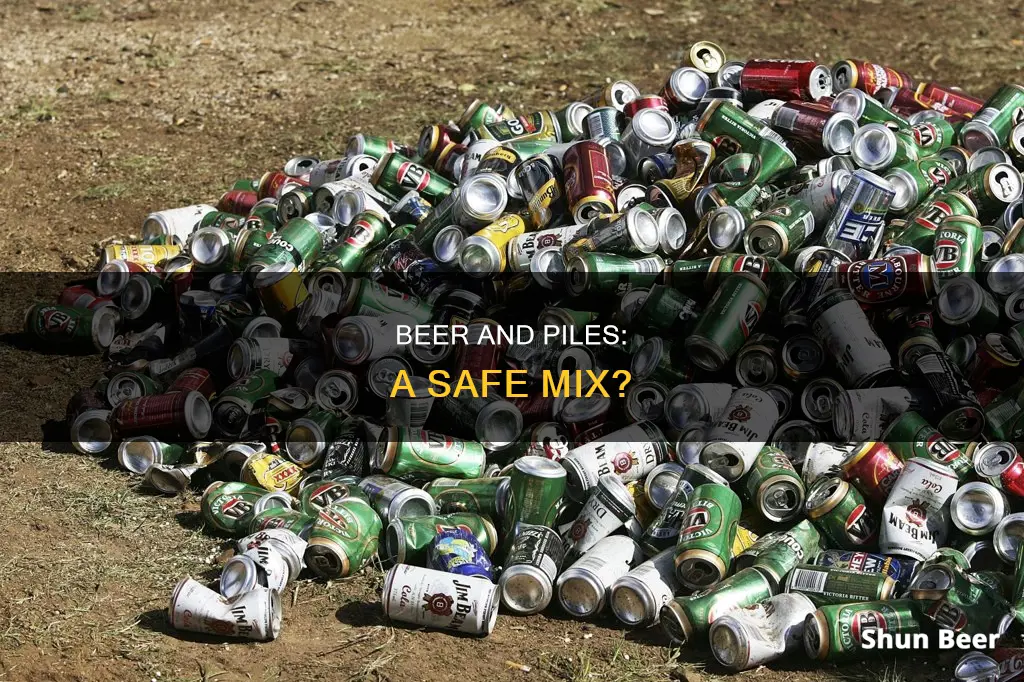
Hemorrhoids, or piles, are a common problem that can be treated with a change in diet. Alcohol is known to dehydrate the body and cause constipation, which can worsen piles. However, some doctors say that drinking beer or whiskey in moderation is fine, as long as you stay hydrated by drinking a lot of water and eating fresh fruits and salads.
What You'll Learn
- Alcohol consumption can cause dehydration, increasing the risk of piles
- Drinking beer in moderation may be okay, but excessive consumption can lead to piles
- Alcohol can cause constipation, which is a trigger for piles
- Alcohol can lead to obesity, which is a risk factor for piles
- Alcohol-related liver disease and cirrhosis can cause hemorrhoids

Alcohol consumption can cause dehydration, increasing the risk of piles
Alcohol consumption can cause dehydration, which increases the risk of piles. Dehydration occurs when the body does not have enough fluids to function effectively. Alcohol is a diuretic, which means it increases the amount of urine the body produces, causing the body to lose fluids and electrolytes. This can lead to dehydration, especially if a person consumes large quantities of alcohol or drinks on an empty stomach.
The link between dehydration and piles is a natural progression. Dehydration is one of the most common causes of constipation, as the large intestine soaks up water from food waste when the body is dehydrated, making stools hard and dry. This leads to increased straining during bowel movements, which puts pressure on the blood vessels around the anus. Over time, this can cause inflammation and lead to the development of piles.
To counteract alcohol-induced dehydration, it is important to take some preventative measures. These include consuming alcohol in moderation, drinking slowly, and alternating alcoholic drinks with water. It is also advisable to eat while drinking alcohol, as food can slow down the absorption of alcohol and help reduce the risk of dehydration.
While some sources suggest that drinking a limited amount of beer or whiskey is acceptable for people with piles, it is important to prioritize proper hydration and consume alcohol in moderation. Dehydration can increase the risk of piles, and alcohol consumption can contribute to dehydration, so it is crucial to be mindful of fluid intake and practice moderation when consuming alcohol.
Old Beer: Is It Safe to Drink After Three Months?
You may want to see also

Drinking beer in moderation may be okay, but excessive consumption can lead to piles
It is generally agreed upon by medical professionals that drinking beer in moderation may be okay, but excessive consumption can lead to piles. Piles, also known as hemorrhoids, are swollen veins in the lower part of the rectum and anus. These veins can become irritated and painful, and symptoms can vary depending on whether the hemorrhoids are external or internal.
Excessive alcohol consumption can lead to dehydration, which in turn can cause constipation. The risk of developing constipation increases due to dehydration as the body removes extra water from the stool, making it hard and dry. This can cause a person to strain harder than usual during bowel movements, increasing pressure in the abdomen and affecting the anus and rectum, which can result in hemorrhoids.
In addition to dehydration, regular alcohol consumption can also lead to increased blood pressure and obesity, both of which are risk factors for developing hemorrhoids. Liver damage due to excessive alcohol consumption can also contribute to hemorrhoids, as issues with blood drainage can lead to veins around the anus becoming swollen and inflamed.
Therefore, it is recommended that individuals with hemorrhoids avoid consuming alcohol, especially in excess. To prevent hemorrhoids, it is important to stay hydrated, eat a high-fibre diet, and maintain a moderate weight.
Root Beer and Diabetes: Is It Safe to Drink?
You may want to see also

Alcohol can cause constipation, which is a trigger for piles
Alcohol can affect the body in several ways that can lead to constipation. Firstly, alcohol reduces the secretion of antidiuretic hormone (ADH), which signals the body to retain water. With less ADH, the body urinates more, leading to dehydration, a common cause of constipation.
Secondly, alcohol can affect peristalsis or intestinal movement. Drinks containing more than 15% alcohol have an inhibitory effect on peristalsis, slowing gastrointestinal motility and leading to constipation. Conversely, beverages with lower alcohol content, such as beer and wine, can increase gastric emptying rates, especially with chronic alcohol consumption.
Thirdly, alcohol can cause an overgrowth of intestinal bacteria, leading to bloating and constipation. Additionally, metabolising alcohol in the gastrointestinal tract can lead to inflammation, which causes various symptoms, including constipation.
While there is no definitive link between alcohol consumption and inflammatory bowel disease (IBD), alcohol can trigger flare-ups for those with IBD, leading to periods of belly pain and cramping. Similarly, for individuals with irritable bowel syndrome (IBS), alcohol can irritate the gut and trigger a flare-up of symptoms, including constipation.
In summary, while alcohol may not directly cause constipation in all individuals, its dehydrating effects, impact on intestinal movement, and contribution to intestinal bacteria and inflammation can increase the risk of constipation. Therefore, it is essential to understand how your body reacts to alcohol and practise moderation to maintain gastrointestinal health.
Beer and Diverticulitis: What You Need to Know
You may want to see also

Alcohol can lead to obesity, which is a risk factor for piles
Alcohol consumption is linked to obesity, which is a risk factor for piles. Excessive alcohol intake is the third leading cause of premature death in the United States, behind smoking and obesity. Alcohol is high in energy content, with 7 kcal/g, and can contribute to weight gain if not compensated for through other dietary or lifestyle changes.
The relationship between alcohol intake and body weight has been extensively studied, and the findings suggest that light-to-moderate alcohol consumption may not lead to weight gain. However, heavy drinking and binge drinking are more consistently associated with weight gain and obesity. Alcohol may stop the body from burning fat, increase hunger, and lead to cravings for salty and greasy foods, all of which contribute to weight gain.
The impact of alcohol on weight gain may also vary between men and women due to differences in the amount and type of alcohol consumed. Men tend to consume more alcohol and are more likely to drink beer, which is carbohydrate-rich and provides more energy than wine. Additionally, alcohol consumption can increase the risk of liver disease, especially in obese individuals.
While the relationship between alcohol and obesity is complex and influenced by various factors, reducing alcohol intake and maintaining a healthy lifestyle can help mitigate the risk of weight gain and associated health issues.
Pregnancy and Beer: Is Athletic Beer Safe for Expecting Mothers?
You may want to see also

Alcohol-related liver disease and cirrhosis can cause hemorrhoids
Alcohol consumption is a risk factor for hemorrhoids. Drinking alcohol can cause dehydration, which may lead to constipation and cause a person to strain during bowel movements. This strain can cause increased pressure in the abdomen, affecting the anus and rectum and resulting in hemorrhoids. Alcohol consumption can also lead to obesity, which can increase the risk of hemorrhoids due to factors such as pressure in the abdomen, chronic inflammation, and venous congestion.
Additionally, alcohol-related liver disease and cirrhosis can cause issues with blood drainage, leading to swollen and inflamed veins around the anus and contributing to hemorrhoids. Liver disease may cause a backup of blood flow to the liver, affecting blood drainage. In cirrhosis, scar tissue builds up in the liver over time, affecting blood flow and causing the liver to stop functioning correctly. The scarring takes up more space, and the veins cannot properly drain blood, leading to swelling and hemorrhoids.
It is important to note that excessive alcohol consumption is one of the most common causes of high blood pressure, which can also increase the risk of hemorrhoids.
To prevent hemorrhoids, it is recommended to stay hydrated, eat a high-fiber diet, and maintain a moderate weight.
Beer and Diarrhea: What You Need to Know
You may want to see also
Frequently asked questions
Alcohol is not recommended for people with piles as it can worsen symptoms. However, some doctors say that drinking a maximum of one beer is okay.
Alcohol is a diuretic, which means it increases urine production and causes dehydration. Dehydration can lead to constipation and hard stools, which can worsen piles. Alcohol consumption can also increase blood pressure, putting more strain on the veins in the anal and pelvic areas.
It is recommended to eat a lot of fibre-rich foods, including fruits, vegetables, and whole grains. Drinking plenty of water is also important to stay hydrated and prevent constipation.







